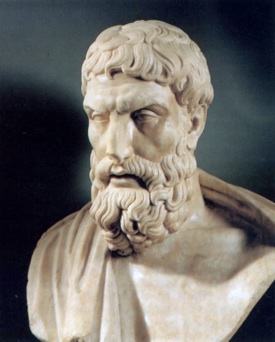
1. The three legs of the "canon of truth," which means that set of tools given to us by nature by which we judge what is true, are: (1) the five senses (seeing, hearing, touching, smelling, tasting), (2) the "preconceptions," also known as "anticipations, and (3) the "passions," the sense of pleasure and pain. "Logic" and "Reason" are not primary elements of the canon of truth.
2. The senses are reliable because they are devoid of reason and memory - they simply report what they perceive.
3. The senses are reliable because they are not by themselves the cause of any perception - when they receive an impression from any external cause, they can add nothing to it, nor can they subtract anything from it.
4. The senses are reliable because they are out of the reach of any external control. One sensation cannot judge another sensation of the same type. For example, one observation of sight cannot negate another observation of sight. All sensations from the same sense are of equal reliability.
5. The senses are reliable because one sensation cannot judge another sensation of a different type. For example, a sensation of sight cannot negate a sensation of hearing.
6. Reason cannot judge the senses. For example, reason cannot negate a sensation of seeing or hearing.
7. All reasoning has the senses for its foundation; reasoning totally without sensory evidence of some kind is invalid.
8. The sensations of pleasure and pain are just as real as the impressions of sight and sound.
9. We must judge those things which are distant from us, or obscure from some reason, by their analogy to those things which we perceive directly. We must judge every opinion according to the evidence that we obtain from the senses, whether that evidence is obtained directly, or as a result of some analogy, or some proportion, or some combination of evidence which is observable by us. Reason has a share in the process of making these calculations, but the primary foundation is the evidence from which we must work, not speculation without evidence.
10. The precise definition Epicurus gave to the third leg of the canon, known as "preconceptions" or "anticipations," is unclear. One possibility (the "traditional" interpertation) is that these preconceptions are what other philosophers call "concepts," which are formed by the reasoning mind after exposure to observation or numbers of examples of things of a particular kind. Another possibility (the interpretation favored by DeWitt) is that the term "pre-conception" emphasizes that this faculty exists prior to any reasoning by the mind, and therefore prior to the "conceptualization" process. Under this interpretation, anticipations are better thought of as innate principles of functioning that exist from birth (akin to instinctive behavior in other animals), but which develop over time and serve as inputs into the conceptualization process, in the same manner as do the five senses and the sense of pain and pleasure.
11. Opinions are suppositions for which we must acknowledge we have insufficient evidence to judge them true or false. That which is supported by evidence and not contradicted by evidence is held to be true. That which is not supported by evidence, or is contradicted by evidence, is false. Because we often have insufficient information to be sure whether a matter is true or false, Epicurus introduced the expression of “waiting.” For example, when we approach a tower from a distance and cannot tell whether it is round or square, we must "wait" until we have more direct evidence, as we draw closer, before we make a judgment as to its true shape.